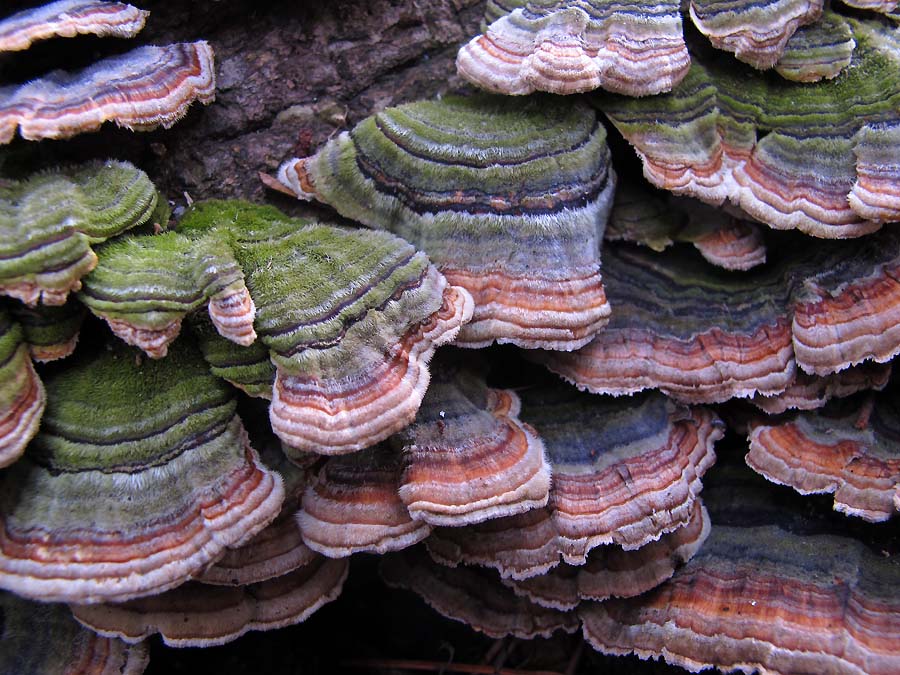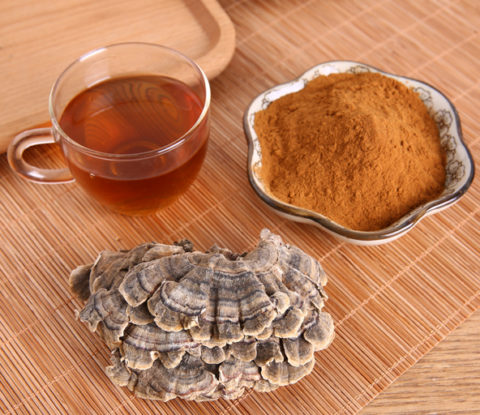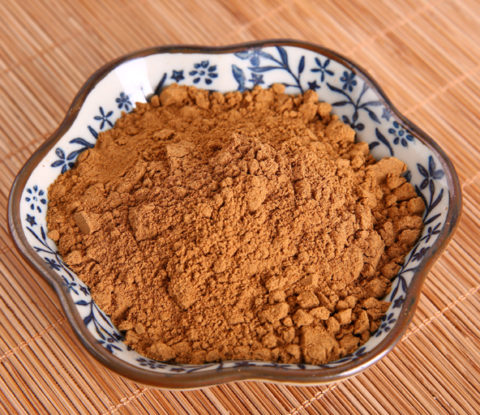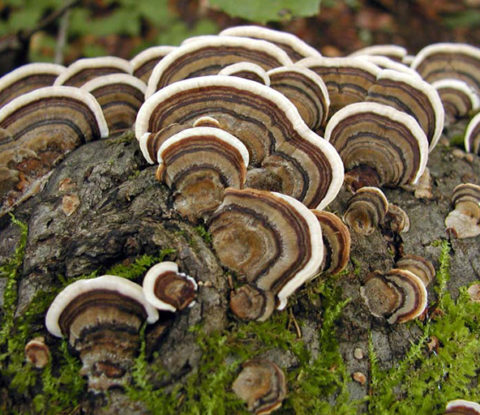
Turkey Tail Extract Powder(Coriolus Versicolor)10%,20%,30%,50%Polysacchrides UV
Our turkey tail extract is 100% wild harvested, free of pesticides, and produced with a dual extraction process to break down the chitin for the best bioavailability.
Turkey Tail/Coriolus Versicolor Extract Powder
【Latin name】: Coriolus Versicolor
【Latin name】: Trametes versicolor, Turkey tail mushroom, rainbow conk, Yun Zhi
【Part of used】: fruitbody
【Active ingredients】: Polysaccharides (including β-glycosidic),PSP,PSK
【Specification】: Polysaccharide kerstin 10%,20%,30%,50% UV, PSP 30% UV
【Appearance】: brown fine powder
【Odor】: characteristic
【Particle size】: 100% pass 80 mesh
【Packing】: 1kg,2kg,5kg/bag (packed in an aluminum foil bag outside; double-layer PE inside); 25kg/fiber drum.
【Physicochemical index】:
Heavy Metal <10ppm(As <1ppm, Pb <2ppm, Hg <0.2ppm);
Pesticides Residues <1ppm;
Total Plate Count <1000cfu/g (Yeast & Mould <100cfu/g, Salmonella: Negative, E.Coli: Negative).
Turkey tail extract powder is one of the best documented mushrooms in scientific research. Turkey Tail mushrooms/fungi– also known as Trametes versicolor, Coriolus versicolor and Polyporus versicolor, are one of the top medicinal fungi in the world, with extensive medical research backing its health promoting attributes. Commonly known as the “turkey tail” in North America, Coriolus versicolor (also known as Trametes versicolor), is unique among the medicinal mushrooms, with extensive use in both traditional herbalism and modern clinical practice. The focus of the modern clinical use and research has been the immuno-modulating and anti-tumor properties of the hot water extracted polysaccharides.
Mushrooms have an established history of use in traditional oriental therapies. In Asian cultures, mushrooms are combined with herbal mixtures to treat cance-r. The mushroom Coriolus Versicolor (coriolus versicolor) is a macrofungi belonging to the Basidiomycetes class, which encompasses about 20,000 and 25,000 known species. InChina, coriolus versicolor is named Yun Zhi (meaning “cloud-like mushroom”). Researches have found that this mushroom has antimicrobial, antiviral and anti-tumor properties. Nowadays coriolus versicolor is mainly used as an adjuvant in the treatment of cancer. It has been demonstrated that extracts obtained from this mushroom are likely to show stimulatory effects on the immune system and to inhibit the growth of cancer cells. Because of these properties, Yun Zhi is called a biological response modifier (BRM).
Composition of Coriolus Versicolor
Turkey tail extract PSP and PSK are light or dark brown powders that are soluble and stable in hot water. The compounds are polysaccharopeptides that are odorless and tasteless. The compounds do not have a definite melting point. Heating to more than about 120 jC gradually chars the polysaccharopeptides. The PSP/PSK polymers are soluble in water but insoluble in methanol, pyridine, chloroform, benzene, and hexane.
An aqueous solution of PSP (1 g/100 ml water) is neutral, with a pH value of between 6.6 and 7.2. The [a]D 25 value of the PSP solution is in the range of 0 – 30j (Hotta et al., 1981). Elemental analysis of PSK polysaccharopeptides reveals the following approximate composition: oxygen 47.5%, carbon 40.5%, hydrogen 6.2%, and nitrogen 5.2%. The powdered extract typically contains 34– 35% soluble carbohydrate (91-93% h-glucan), 28 – 35% protein, f 7% moisture, 6 –7% ash, and the remainder are free sugars and amino acids (Ueno et al., 1980a).
Turkey tail extract PSP and PSK are chemically similar and posses similar physiological activity profiles. PSK is a mixture of polysaccharides that are covalently linked to a number of proteins (Yang et al., 1992a). Polysaccharide and peptide moieties of PSP and PSK cannot be separated by native PAGE and chromatographic methods. Both products have a molar mass of approximately 100 kDa (Yang et al., 1992a; Ng, 1998) and their polypeptides contain large amounts of aspartic acid and glutamic acid (Ng, 1998). Acidic and neutral amino acids such as aspartic acid, threonine, serine, glutamic acid, glycine, alanine, valine, and leucine account for 70% of all the 18 kinds of amino acids present (Hotta et al., 1981). C. versicolor polysaccharopeptides resist enzymatic proteolysis (Hotta et al., 1981).
PSP and PSK contain a-1,4 and h-1,3 glucosidic linkages in their polysaccharide moieties (Ng, 1998). D-glucose is the major monosaccharide present. Arabinose and rhamnose are the other principal monosaccharides in PSP. PSK contains fucose. Also present are galactose, mannose, and xylose (Wang et al., 1996b; Cheng et al., 1998). The polysaccharide moiety is highly branched.
The Difference Between Turkey Tail Extract PSP and PSK
The best know commercial polysaccharopeptide preparations of C. versicolor are PSK and PSP. Both products are obtained from extraction of C. versicolor mycelia. PSK is a Japanese product, while PSP is Chinese product which was first isolated in 1986 (Yang and Van, 1986). Both products have similar physiological activities but are structurally different. PSK is produced from CM-101 strain of C. versicolor, the extraction is done by salting out with ammonium sulfate from the hot water extract. PSP is produced from Cov-1 strain of C. versicolor, the extraction is done by using alcoholic precipitation from the hot water extract. PSP and PSK are light or dark brown powders that are soluble and stable in hot water. They are chemically similar and posse similar physiological activity profiles, PSK and PSP differ mainly in the presence of fucose in PSK and rhamnose and arabinose in PSP.
Benefits of Coriolus Versicolor/ Turkey Tail Extract
1. Immunomodulatory effects
The immunological activities of turkey tail extract PSP and PSK have been extensively investigated both in vitro and in vivo. PSP strengthening the immunological functions was studied. Its anti-tumo-r effect seemed to be mediated more through immunomodulatory regulation rather than by direct cytotoxicity as was the case for most anticancer drugs currently used. Numerous reports had demonstrated the ability of PSK and PSP to active cellular and humoral components of the host immune system. In addition, these polysaccharides had been shown to inhibit the growth of tumor cell lines and to have in vivo anti-tumor activity (Tzianabos, 2000).
The effect of PSP on the phagocytic functions had been tested in normal ICR mice. It was determined that the carbon clearance rate of the groups given oral doses of 0.5-1.5g PSP/kg or intraperitoneal (i.p.) injections of 100, 200, 400mg/kg was similar to that of groups treated with acanthopanax (300mg/kg). Regardless of the route of administration, PSP increased the carbon clearance rate in mice and it suggested that PSP could increase the phagocytic function of normal animals (Yang et al, 1993). It was reported that PSP in different concentrations promoted the proliferation of T-lymphocytes both in human peripheral blood and mouse splenocytes (Li, 1999). PSP augmented T-helper cell (CD4 +) activation, and also increased the ratio of CD4+/T suppressor (CD8+) production (Li, 1999). It appeared that the basic mechanisms for PSP to inhibit tumo-r cells included the activation of 1) macrophages, 2) natural killer cells and 3)T-helper cells (CD4+) which induce T-killer cells, antibody production, and interleukins (Li, 1999).
2. Anti-tumor effects in vivo
Many studies have been done since 1980’s to demonstrate the effectiveness of turkey tail extract PSP, and its counterpart PSK. The anti-tumor actions are predominantly considered to be host-mediated. The preliminary determination of antitumor activity is usually assessed by a bioassay system normally using Sarcoma 180 in mice and B16 melanomabearing mice through transplantable animal tumor (Yang et al, 2007). Several hundreds of polysaccharides or polysaccharide-protein complexes have been screened for their anti-tumo-r activity, and three of them, namely schizophyllan, lentinan and protein-bound polysaccharides (PSK and PSP), have been used clinically (Kobayashi et al, 1993). PSK has been successful in postoperative treatment of respectable cancer in humans, increasing survival rates (Ito et al, 2004). Protein-bound polysaccharide (PSK) prepared from the cultured mycelia of Coriolus versicolor in Japan demonstrated a significant anti-tumor effect against allogeneic tumors such as Sarcoma 180 and Ehrlich carcinoma of experimental animals by both intraperitoneal and oral administration (Taniguchi et al, 1984; Kobayashi et al, 1993).
Researches indicated that turkey tail extract PSK and PSP can suppress pulmonary metastasis from induced sarcomas, induced prostate cance-r, lymphatic metastasis of mouse leukemia P388, and that both could prolong the survival period in spontaneous metastasis model (Xu, 1999). Polysaccharopeptides from C. versicolor influence cance-r metastasis in a number of ways: 1) by suppression of intravasation through the inhibition of tumor cells infiltration, 2) by suppression of tumor cell attachment to endothelial cells through the inhibition of tumor cellinduced platelet aggregation, 3) by suppression of tumor cell migration after extravasation through the inhibition of tumor cell mobility, and 4) by suppression of tumor growth after extravasation through the inhabitation of angiogenesis, the modulation of cytokine production and the augmentation of effector cell function (Liu et al, 2004).
Clinical Studies on Coriolus Versicolor/ Turkey Tail Extract
The therapeutic use of turkey tail extract PSP or PSK as an adjuvant therapy in cance-r treatment has been substantiated by numerous clinical trials. Table 6 summarizes the methodological parameters and the results of some these trials. As an adjuvant in the treatment of many types of cancers, Yun Zhi (PSP) was subjected to Phase I, II and III clinical trials in Shanghai,China. The results showed that addition of PSP to radiotherapeutic or chemotherapeutic protocols can greatly improve the quality of life of cancer patients and reduce chemotherapy-induced side effects (Zhong et al, 2001), because PSP alleviated weakness, anorexia, vomiting, dryness of throat, spontaneous sweat and pain symptoms. In addition to symptoms improvement, polysaccharopeptides from Yun Zhi also have an impact on the survival rate of different types of cancer. PSK used in Japanese trials significantly extended the survival rate at five years for stomach, colorectal, esophagus, nasopharynx, breast and lung cancers. Study also showed that PSP has effect of cancer prevention and development (Zhou et al, 2001). The following were the clinical trial results selected from research papers conducted in Japan.
1. Breast cancer
As early as 1970, breast cancer patients received long term combination chemotherapy along with turkey tail extract/C. versicolor extract immunotherapy. Addition of the extract to the regimen significantly extended the survival rate. In a large trial done in 1995 in Japan, the survival rate at 10 years was 81% for the PSK plus chemotherapy group which the rate fell to 64% for the group that used chemotherapy alone. The study concluded that immuno-chemotherapy with mushroom extract could improve the prognosis of patients with resectable breast cancer with vascular invasion. Mild and well tolerated side effects such as leukopenia and nausea were observed in 5 out 227 patients (Iino et al, 1995).
2. Colorectal cancer
Turkey tail extract/C. versicolor extract was assessed for its potential anticancer activity in patients with advanced colorectal cancer (stages III and IV) (Torisu et al, 1990). PSK was given at 3 grams/day for two months after surgery, followed by 2 grams/day until the end of the second year and 1 gram/day thereafter. This study found that the leukocyte activity of the PSK group was remarkably enhanced. Notably, polymorphonuclear leukocytes from PSK-treated patients showed enhancement in their activities, such as random and/or chemotactic locomotion, and phagocytic activity, when compared with those of the control group. The survival rate of the PSK group reached 40%, a net improvement over the 25% rate registered for the placebo group. From this study, it was concluded that PSK could be useful as a maintenance therapy for patients after their curative surgical operations for colorectal cancer. Sakamoto and colleagues performed in 2006 a metaanalysis of colorectal cancer, which involved 1094 patients in three clinical trials. The aim of the metaanalysis was to evaluate the effect of PSK as adjuvant immunochemotherapy for patients with curatively resectal colorectal cancer. The results suggested that adjuvant immunochemotherapy with PSK can improve both survival and disease-free survival of patients with curatively resectal colorectal cancer.
3. Gastric and esophageal cancer
Stomach cancer is a major cause of mortality in Japan and China and, for that reason, has been the object of many clinical trials with polysaccharopeptides from C. versicolor. Trials done in the 1970s and 80s had evidenced a better survival rate at two or three years. More recent clinical studies, done in the 1980s and 90s, established that PSK could improve the survival rate at five years and beyond in stomach cancer patients, including some patients with advanced Stage III and IV cancer with metastasis (Kidd, 2000).
In a randomized clinical trial including 579 patients with gastric cancer receiving chemotherapy, C. versicolor extract was administrated orally as an adjuvant to surgery in a combination therapy to part of the group, at a daily dose of 3 grams for 1 year. Results from this study showed a significant increase in the 5-year survival rate for the PSK-treated group when compared with the other groups (Niimoto et al, 1988). In an additional study involving more than 260 patients who underwent surgery for stomach cancer at 46 hospitals in Japan, those who received PSK along with chemotherapy experienced a higher 5-year disease-free rate and a better 5-year survival rate than subjects who underwent chemotherapy alone (73% vs. 60%). The two regimens had slight toxic effects, consisting of nausea, leucopenia, and liver function impairment but no characteristic toxic effects were linked to PSK administration (Nakazato et al, 1994).
Trials with PSP indicated that turkey tail extract/C. versicolor extract has the potential to alleviate the side effects normally associated with chemotherapy (lassitude, inappetence, spontaneous perspiration, etc.) in patients with stomach cancer classified as stage I to IV (Zhang et al, 1999). Moreover, an increase in the immunological functions and a concomitant decrease of the adverse hematological side effects of chemotherapeutical d-rugs was demonstrated for stomach cancer patients following the administration of PSP (1 gram three times a day for 8 weeks) (Wu et al, 1999). Results from a prospective multi-centre study including 158 esophageal cance-r patients, indicated that those who received PSK (3 grams/day for three months after surgery) had a significantly better survival rate at five years (55% and 58%) compared with those without PSK supplementation (26% and 31%) (Ogoshi et al, 1995a). Another study reported the results of 174 patients who underwent esophagectomy and were then assigned to receive radiotherapy or chemotherapy with or without PSK. There was a tendency for longer survival on PSK, but statistical significance was not reached. However, regression analysis indicated that C. versicolor extract might have a beneficial effect on esophageal carcinoma when combined with radiotherapy and chemotherapy (Ogoshi et al, 1995b).
Better survival rates were also achieved with turkey tail extract PSP. A hundred patients with esophageal carcinoma were randomly divided into two groups: one group was treated with radiotherapy alone while other one received radiotherapy plus PSP (3 grams daily for a total dose of 190 grams during the period of radiation time). The results demonstrated that patients treated with radiotherapy plus PSP had higher one, three and five survival rates (67%, 38%, and 19% respectively) versus the control group (47%, 21% and 14%) (Yao, 1999). Addition of PSP to the regimen improved the relief of major symptoms commonly associated with esophageal cancer, such as change of weight, alteration in the hemogram profile and in immunological functions. The relief of these symptoms was quantified to reach 61% in the PSP-treated group, while it was 31% in the control group (Wu and Wang, 1999). A Meta-analysis study was performed to evaluate the effect of immunochemotherapy on survival in patients with curative resections of gastric cancer. The metaanalysis included 8,009 patients from eight randomized controlled trials after central randomization. The results suggest that adjuvant immunochemotherapy with PSK improves the survival of patients after curative gastric cancer resection (Oba et al, 2007).
4. Leukemia
A study with turkey tail extract PSK as an adjuvant to chemotherapy done in the early 1980’s (with 28 patients) found that remission and survival were significantly prolonged for patients who received PSK plus chemotherapy over those who received chemotherapy alone (Nagao et al, 1981). In another multi-center trial including 67 patients in remission of acute non-lymphocytic leukemia (ANLL) in Japan, patients who received a maintenance chemotherapy plus immunotherapy with PSK tended to have longer survival over the group that received chemotherapy alone but without significance. However, analysis of the data of patients who had maintained complete remission for more than 270 days revealed that immunotherapy had a suggestive beneficial effect (p=0.105), prolonging the 50% remission period by 418 days (885 vs. 467 days). It was concluded that PSK may help in the treatment of adult ANLL when used for maintenance therapy in combination with chemotherapy, especially in patients with a good prognosis.
5. Lung cancer
A clinical trial conducted in Japan was done with patients having different lung cancers at stages I-III; a group was selected to receive 3 grams of turkey tail extract PSK daily after cessation of radiation therapy. PSK was given in repeating cycles of two weeks on and two weeks off. After 5 years, 27% of the patients treated with PSK were alive compared to 7% for those not given the mushroom extract (Hayakawa et al, 1993). The study also demonstrated that patients with Stage III disease who received PSK had a better prognosis than those with stages I and II without PSK. A study investigated the effects of PSK as an accessory treatment for lung cancer (Ke et al, 1999), 30 patients were administered the mushroom extract while they received chemotherapy. The symptoms (side effects) improvement for PSP-treated patients was over 87%, while it was 47% for the control group. Thirty-four patients, with no significant difference in their baseline demographic, clinical or tumor characteristics, or previous treatment regimes (p>0.05), were recruited into each of the PSP and control arms. After 28-day treatment, there was a significant improvement in blood leukocyte and neutrophil counts, serum IgG and IgM, and percent of body fat among the PSP, but not the control patients (p<0.05) (Tsang et al, 2003).






